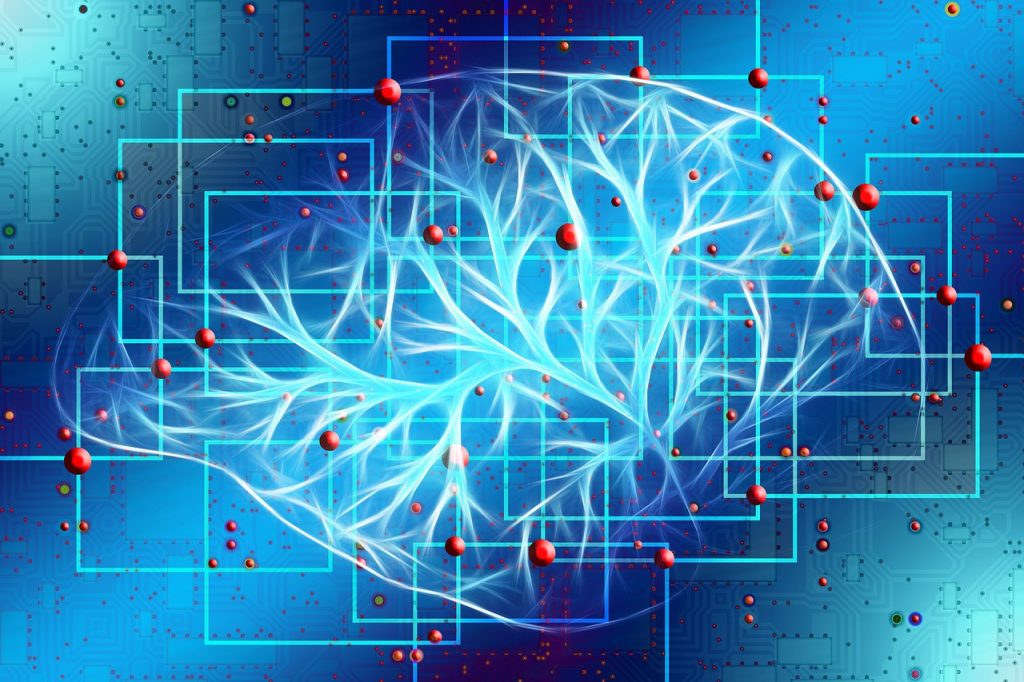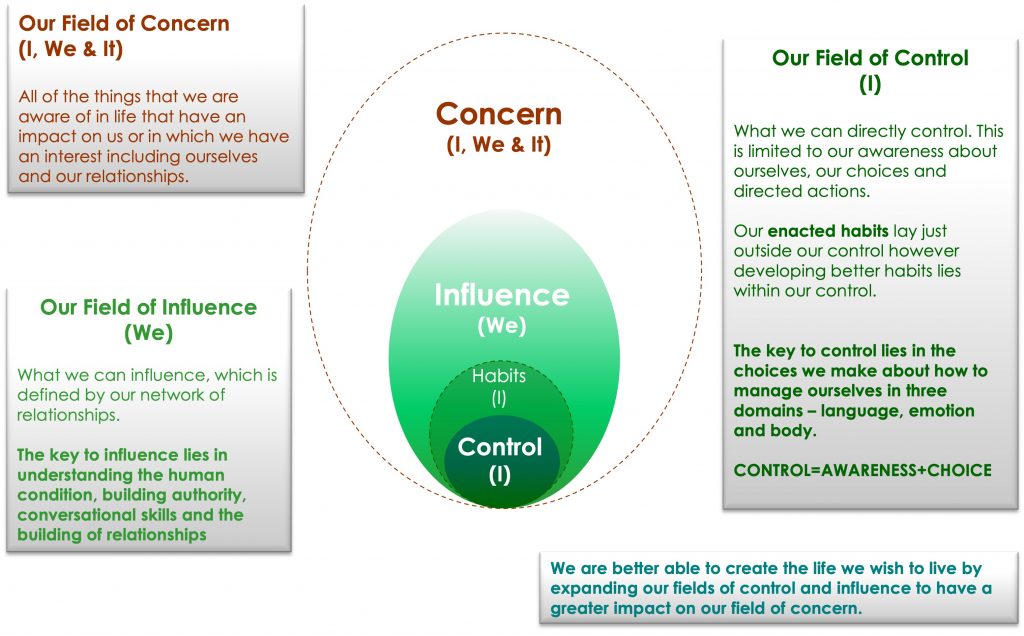
Our relationship with the future throws up two major apprehensions about life. The first relates to the one certainty of our life – our death; a certainty we all have to address at some stage in our life. However, most of us do not have to deal with our ultimate end on a daily basis.
The second concern relates to the uncertainty of the future. A concern that is far more present given that we are always stepping into the future and therefore the unknown. How we face up to our uncertain future plays a large part in our self-story and ways of being.
We can utilise Ken Wilber’s concept of the Big 3 – ‘I, We and It’ – to create a useful perspective on how to address the challenge of an uncertain future and where we can put our energy to achieve a more fulfilling life. We can create this perspective by defining three areas of life – what we can control, what we can influence and what concerns us.
Let us start with what matters to an individual. This is delineated as the ‘Circle of Concern’ as shown in the diagram below and covers all three domains. The ‘Circle of Concern’ represents everything that matters to us. This includes aspects we can control or influence. However, by its nature, the ‘Circle of Concern’ will always contain many things outside our influence or control. For example, most people have an interest in the weather and its impact on their daily life; yet can do nothing to influence it.
At the heart of the ‘Circle of Concern’ lies the ‘Circle of Control’. This resides exclusively in ‘I’ domain and represents the aspects of a person’s world they can directly control. In this work, ‘Control’ relates to what we can directly make happen as a result of our choices regardless of the agreement of others. Our ‘Circle of Control’ can only relate to ourselves and, for that matter, only to our conscious self. Why is this?
‘Control’ is directly linked to conscious choice and free will – ‘Control = Awareness + Choice’. As such, someone can only exert control over aspects of their own way of being of which they are aware. As most human action is habitual, we generally act without conscious decision and play out well-worn patterns of action. In my view, unrecognised habitual action in the moment is outside of our direct control. It is useful to appreciate habits are not just physical actions but include how we observe and interpret our observations. It follows that the greater our capacity for self-awareness then the greater our capacity to have control over our way of being as we can intervene in habitual action.
Sometimes we are well aware of our habits and seek to change them. However, we may be aware of ourselves falling into a habitual act, such as eating high sugar content food when we say we wish to eat healthier foods, but find our habit still has us snack on a chocolate bar. Clearly this speaks to a lack of control even when we find ourselves in a choice point, so it is important to recognise that, to fall into our ‘Circle of Control’, our moment by moment choices have to be aligned with our bigger declarations for the future.
Generally people assume others act with intent. As a result, society and others will hold us accountable for our habitual actions. This often makes generating more effective habits a wise choice. However to do this, we must first become aware of our habits and decide to do something about them. Yet, as our habits are embodied, they are likely to recur despite any declaration we might make. Simply recognising them and deciding to do something about them is just not enough. Just ask anyone who has made an unfulfilled New Year’s Eve resolution. Beyond the initial decision to act, we require a clear aspirational self-story and frequent repetition of future action. This will require ongoing self-awareness in future moments. Ultimately the creation of new habits falls within our Circle of Control and, if we can develop new aligned habits, we can create a greater sense of integrity.
Finally, given human beings are social beings, we are able to impact on our ‘Circle of Concern’ through others. This is our ‘Circle of Influence’ and is related to the quality of our relationships and the quality of the conversations that happen within those relationships. It speaks to our capacity to build our authority with others and gain substantive promises from them. Ideally, this occurs within healthy relationships based on trust rather than more toxic relationships where one person seeks to control the other. The bigger the promises we can gain from others, the bigger the impact on our ‘Circle of Concern’.
The challenge of dealing with an uncertain future lies in part in our belief in our capacity to deal with that uncertainty. We can use the concept of control, influence and concern to address specific challenges or to create more possibilities for the future.

Good article that outlines the things I unknowingly do (habits) that may be perceived as intentional actions.
CONTROL = AWARENESS AND CHOICE. my understanding to this is that being aware of the choices we make and choosing to make the best choice. By saying this one must be aware that we may be subconsciously reacting to something , sometimes not even thinking of the choice in our reaction. Awareness may not come until after the fact. That is the challenge. actually taking time to think of our choices and choose the correct one. so, this takes practice but may be a part of each individuals experiences. Does anyone feel the same?
Thanks for your comment. I can see how you can come to that conclusion. It seems to me you are speaking of conscious and unconscious choices and that habitual action speaks to unconscious choice. Sometimes we become aware of an unconscious choice at a later stage. The challenge lies in how to make timely and effective conscious choices. Have I interpreted that correctly?
From my perspective, control comes with awareness in the moment. My work utilises the idea that we can anticipate such future moments and seek to generate awareness at those times and putting us in a conscious choice point. You can read about these ideas here.
Once in a conscious choice point, we can either go with a predetermined choice consistent with who we want to become or a predetermined choice process based on who you want to become. I think of this as living in the question.
Correlating the definition of the ‘field of control’ with the summary of the various fields is enlightening.
Field of control- limited to our AWARENESS of ourselves, our choices, and our direct actions.
Summation- I am better able to live the life I wish to live by expanding my field of control and influence to have a greater impact on my field of concern.
To live my best life, I must seek to expand my awareness of self, my choices and my direct actions.
That the field of influence is underpinned by “we” ties us together when “I” isn’t enough.
The fact that ‘enacted habits’ lay just outside our control, so aptly describes my life journey. Controlling my language, emotion and body in such a way that I stay true to the shared values of mutual respect and dignity… that’s the journey.
Thanks for your comment Shannon… For me, part of the beauty of this idea is our ability to build new habits aligned to the person we want to become. I wish you well on your journey!